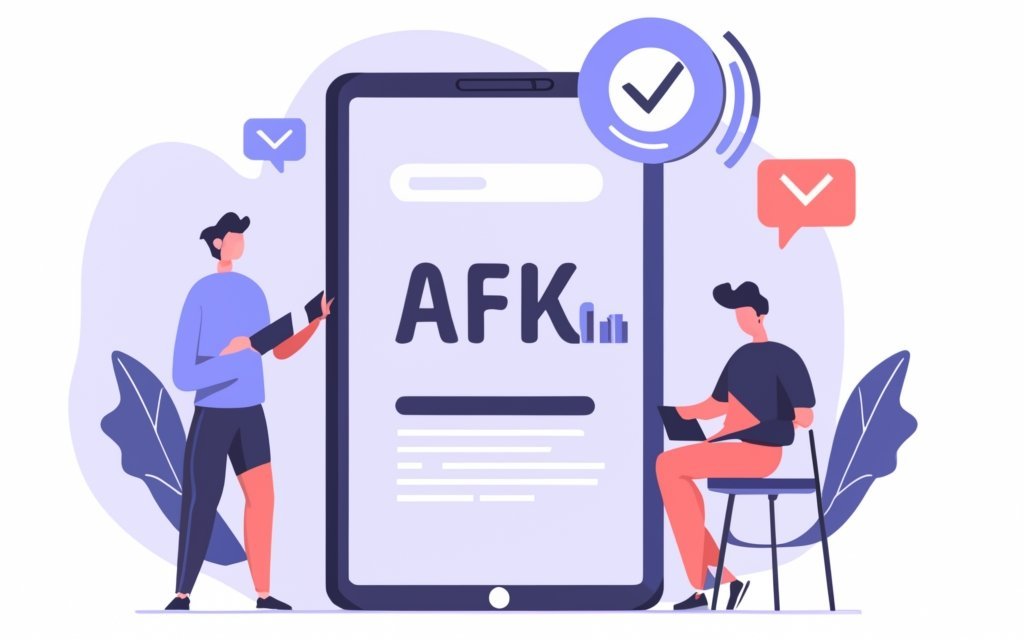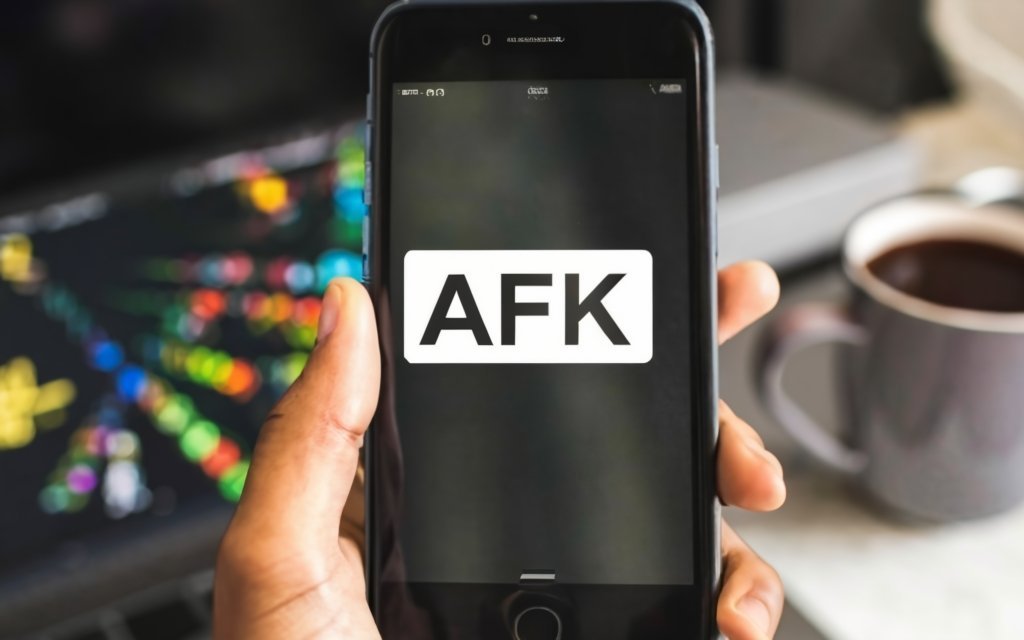AFK stands for “Away From Keyboard.” It’s a common abbreviation used in texting, messaging, and online gaming to indicate that you’re stepping away from your device for a while and won’t be able to respond immediately.
Here’s how AFK is typically used:
- Indicating temporary absence:
- “Hey, I’m going to be AFK for a few minutes, need to grab a snack.”
- “Sorry for the delay, I was AFK.”
- Explaining non-response in conversations:
- “You there? Or AFK?”
- “I think she’s AFK, hasn’t replied in a while.”
- Signaling unavailability in online games:
- “Going AFK for a bit, BRB.” (BRB means “Be Right Back”)
- “AFK, need to take care of something IRL.” (IRL means “In Real Life”)
Other common variations of AFK include:
- Brb afk: “Be right back, away from the keyboard.”
- Afk a sec: “Away from keyboard for a second.”
- Brain afk: “Not paying attention, distracted.”
- Afk-assassination: “Being killed in a game while inactive.”
Key points to remember:
- AFK is a casual, informal term, so it’s best used in relaxed conversations and online settings.
- It’s considered polite to use AFK to let others know you’ll be unavailable, especially in situations where responsiveness is expected.
- In gaming, AFK players can sometimes be penalized for inactivity, so it’s important to use the term appropriately to avoid negative consequences. You should consider reading another article I wrote about >>>>> What Does TBH Mean In Texting? to learn more.
AFK: Where Have All the Texters Gone?
Ever tap out a witty message, hit send, then stare into the abyss of a silent notification bar? Fear not, digital citizen, for your friend hasn’t vanished to Narnia; they’ve simply gone AFK.
But what does AFK actually mean? In the ever-churning vortex of texting lingo, acronyms take on lives of their own. This one, however, is as straightforward as a double-tap “like”: Away From Keyboard. It’s a digital smoke signal, letting your fellow texters know you’ve stepped away from your phone/laptop/tablet/cerebral implant (no judgment).
Why is AFK such a texting MVP?
- Expectation Management: Imagine firing off a joke about office memes, only to discover your recipient is mid-defusing a real-life workplace crisis. AFK sets expectations, avoiding awkward radio silence and potential misunderstandings.
- Communication Flow Control: Let’s face it, sometimes we’re bombarded with pings and dings. AFK lets you hit pause, catch your breath, and avoid drowning in the digital deluge.
- Relationship Maintenance: Just like real-life friends need coffee breaks, digital buddies need space too. AFK lets you maintain connections without feeling perpetually chained to your device.
Table 1: AFK in Action
| Scenario | Message | Benefits |
|---|---|---|
| Grabbing a sandwich | “AFK for lunch, be back in 10!” | Sets clear expectations, avoids confusion. |
| Heading to a meeting | “BRB, meeting in 5. AFK after that.” | Prioritizes mental well-being, and avoids potential misunderstandings. |
| Feeling overwhelmed | “Brain AFK, taking a break. Chat later!” | Sets clear expectations, and avoids confusion. |
Remember, AFK isn’t just for hardcore gamers anymore. It’s a universal signal of digital downtime, applicable to all walks of texting life. So, embrace the power of AFK, use it responsibly, and let your virtual friends know you exist in the real world too.
Beyond the Screen: AFK’s Cultural Footprint.
AFK isn’t just a fleeting notification; it’s a reflection of our changing communication norms. Gone are the days of instant reply pressure and synchronous conversations. Modern life pulsates with a rhythm of pings and buzzes, demanding asynchronous connection. AFK empowers us to navigate this rhythm, embracing a more fluid and flexible communication style.
Table 2: AFK’s Cultural Impact
| Aspect | Before AFK | After AFK |
|---|---|---|
| Communication flow | Synchronous, demanding immediate response | Asynchronous, allowing for breaks and delayed replies |
| Relationship expectations | Constant availability, potential for overload | Flexibility, understanding of intermittent unavailability |
| Cultural norms | Emphasis on speed and immediacy | Acceptance of slower, more measured communication |
AFK fosters a healthier digital environment by setting boundaries and managing expectations. It allows us to be present in the moment, whether attending a yoga class or savoring a sunset, without the nagging guilt of unanswered messages. This, in turn, fosters deeper, more meaningful connections when we do return to the digital tapestry.
But with great power comes great responsibility. Just as an unattended campfire can spark chaos, an inconsiderate “AFK” can leave friends in the lurch. Here’s how to strike the perfect balance:

- Clarity is key: Don’t just vanish – state your estimated return time or the reason for your absence. “AFK for dinner, back in an hour!” is infinitely more courteous than simply disappearing.
- Mind the context: Dropping “AFK” in the middle of a heated debate might add fuel to the fire. Use it wisely and consider its potential impact on the conversation.
- Practice empathy: Remember, others might be waiting for your response. Avoid prolonged AFK stints unless absolutely necessary.
The Future of AFK: A Glimpse Beyond the Keyboard.
As technology evolves, the way we communicate shifts and morphs. Voice messaging challenges text’s dominance, while AI assistants blur the line between human and machine interactions. So, what does the future hold for our humble AFK?
Here are some possibilities:
- Voice-activated “AFK” notifications: Imagine saying “AFK, taking a walk” to automatically update your contacts. No more typing is required!
- Contextual awareness: Intelligent systems could automatically detect your unavailability based on calendar appointments, location data, or even your heart rate. No more need to explain away a sudden AFK!
- Personalized “AFK” avatars: Your digital persona could show animated “AFK” states, giving your friends a visual cue of your whereabouts (though perhaps not the faceplant you just took into your bowl of cereal).
But one thing remains constant: the need for clear communication and respect for boundaries. As we embrace new technologies, let’s use “AFK” responsibly, ensuring it remains a tool for building stronger connections, not bridges to digital isolation.
Remember, dear texter, AFK is more than just a keyboard-centric acronym. It’s a symbol of our evolving relationship with technology, a reminder that the human experience transcends the digital screen. So, embrace the power of pause, utilize “AFK” with consideration, and remember, that life exists beyond the blinking cursor. Until next time, happy texting!
Finding Balance: AFK for a Healthier Digital Life.
AFK isn’t just a convenient tool; it’s a call for mindful communication. In a world where digital overload can lead to burnout and distraction, AFK empowers us to reclaim control over our attention and prioritize well-being.
Here are some tips for using AFK to foster a healthier digital life:
- Set boundaries: Schedule AFK breaks throughout your day to disconnect from devices and recharge.
- Respect others’ AFK time: Don’t bombard people with messages when they’ve indicated they’re unavailable.
- Use AFK to practice mindfulness: When you step away from the keyboard, be fully present in the moment.
- Don’t fear missing out: AFK moments allow you to connect with yourself and the world around you without the distraction of social media.
- Encourage AFK culture: Advocate for workplaces and social settings that respect people’s need to disconnect.
Table 3: AFK for Well-Being
| Challenge | AFK Solution |
|---|---|
| Overwhelm and stress | Schedule regular AFK breaks to decompress. |
| Sleep disturbances | Set a strict AFK time before bed to promote restful sleep. |
| Difficulty focusing | Use AFK periods to clear your mind and enhance productivity. |
| Social anxiety | Take AFK breaks from social media to reduce comparison and pressure. |
Remember, AFK isn’t about avoiding connection; it’s about creating a healthier, more sustainable way of engaging with the digital world. By embracing AFK, we can find balance, protect our mental health, and cultivate deeper, more meaningful relationships—both online and offline.
Conclusion: AFK – Acronym for a Connected Future.
AFK began as a simple gaming term but has evolved into a symbol of our changing communication landscape. It represents our growing awareness of the need for boundaries, mindfulness, and respect in a hyperconnected world.
As we continue to navigate the ever-evolving realm of digital communication, let’s remember the power of AFK:
- To set expectations and manage communication flow.
- To foster healthier relationships and prioritize well-being.
- To embrace a more flexible, asynchronous communication style.
- To create a more balanced and sustainable digital experience.
So, the next time you find yourself needing a moment away from the digital chatter, don’t hesitate to go AFK. It’s not a sign of disengagement; it’s a sign of self-awareness, respect for others, and a commitment to a more mindful, connected future.
Stay tuned for future explorations of the ever-evolving world of texting and messaging, as we continue to decode the digital language that shapes our connections. Happy texting, and remember, sometimes the most meaningful conversations happen when we step away from the keyboard and into the world around us.







